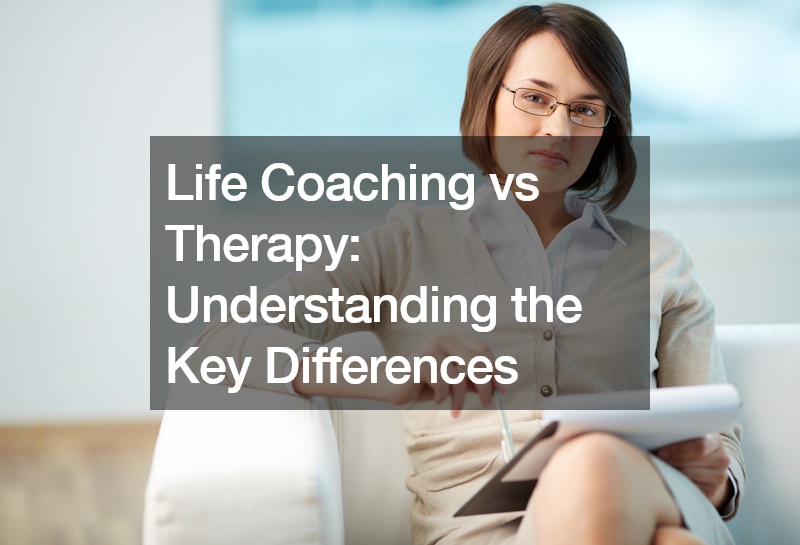In the realm of personal development and emotional support, two distinct approaches stand out: life coaching and therapy. Each plays a crucial role in helping individuals navigate their lives and achieve personal growth, yet they differ significantly in focus, methodology, and objectives. Understanding these differences is essential for anyone considering seeking guidance or support for their mental well-being or personal goals.
What is Life Coaching?
Life coaching is a practice focused on helping individuals achieve their goals and improve their lives by identifying obstacles and developing strategies to overcome them. Unlike therapy, which often delves into past traumas and psychological issues, life coaching primarily looks towards the future.
A life coach works with clients to clarify their aspirations, set meaningful goals, and take action towards achieving them. They act as motivators, strategists, and accountability partners, guiding clients through challenges and celebrating their successes.
What is Therapy?
Therapy, on the other hand, is a broader term encompassing various psychological treatments aimed at improving mental health, resolving emotional issues, and treating disorders. Therapists, such as psychologists, psychiatrists, and licensed counselors, delve into clients’ past experiences, emotions, and behaviors to identify and address underlying issues. Therapy often involves diagnosing mental health conditions, providing treatment plans, and using techniques such as cognitive-behavioral therapy (CBT), psychoanalysis, or medication management, depending on the client’s needs.
Focus and Approach
The primary distinction between life coaching and therapy lies in their focus and approach. While therapy emphasizes healing, resolving past traumas, and managing mental health conditions, life coaching is future-oriented. A life coach helps clients define their goals, clarify their visions for the future, and develop actionable plans to achieve success in various aspects of life, such as career, relationships, health, and personal growth.
Client Base and Goals
Life coaches typically work with individuals who are already functioning reasonably well but seek to enhance their lives further. Clients may include professionals looking to advance their careers, individuals striving for better work-life balance, or anyone aiming to achieve personal goals. They are often proactive, motivated individuals who want support in maximizing their potential and overcoming specific challenges hindering their progress.
In contrast, therapy clients may seek help for a wide range of reasons, including depression, anxiety, trauma recovery, addiction, or relationship issues. Therapists provide specialized interventions tailored to address psychological disorders, manage symptoms, and promote emotional well-being. The therapeutic process involves deeper exploration of emotions, past experiences, and unconscious patterns influencing current behaviors and feelings.
Methodologies and Tools
Life coaching sessions typically involve structured conversations, goal-setting exercises, and action plans designed to empower clients and foster personal growth. Coaches use techniques such as visualization, affirmations, and accountability frameworks to support clients in achieving their objectives. The focus is on building strengths, developing skills, and cultivating resilience to navigate challenges effectively.
In contrast, therapy sessions may include a range of therapeutic techniques and interventions tailored to the client’s specific needs and diagnosis. Therapists employ evidence-based practices to address psychological symptoms, promote healing, and facilitate emotional processing. The therapeutic relationship often involves a more formal and clinical setting, where confidentiality and ethical guidelines play a critical role in ensuring client well-being.
Collaborative vs. Diagnostic Approach
Another key difference is the nature of the relationship between practitioner and client. Life coaching tends to be more collaborative, with the coach and client working together as equals to explore possibilities, set goals, and take action. The focus is on empowerment and personal agency, with the coach providing support, guidance, and encouragement throughout the client’s journey.
In contrast, therapy often follows a diagnostic and treatment-oriented approach. Therapists assess, diagnose, and treat mental health conditions using established therapeutic frameworks and interventions. The therapeutic relationship may involve exploring deeply rooted issues, processing emotions, and implementing strategies to alleviate symptoms and improve overall well-being.
Choosing Between Life Coaching and Therapy
When deciding between life coaching and therapy, it’s essential to consider your specific needs, goals, and current mental and emotional state. If you’re seeking support for personal growth, goal achievement, or navigating life transitions, a life coach may be the right choice. Their focus on future-oriented strategies and goal attainment can help you clarify your vision and develop practical steps to move forward.
On the other hand, if you’re struggling with persistent emotional distress, mental health symptoms, or unresolved trauma, therapy may be more suitable. Therapists are trained to provide therapeutic interventions that address underlying issues, promote healing, and enhance psychological well-being. They can help you understand your emotions, develop coping skills, and achieve a deeper level of self-awareness and emotional resilience.
Conclusion
In conclusion, life coaching and therapy are valuable professions that serve distinct purposes in supporting individuals’ mental health and personal development. Life coaching focuses on empowering clients to achieve their goals, enhance their lives, and maximize their potential through future-oriented strategies and action plans. Therapy addresses psychological issues, heals past wounds, and promotes emotional well-being through therapeutic interventions, diagnosis, and treatment.
Whether you choose life coaching or therapy depends on your current needs, goals, and preferences. Both approaches offer unique benefits and can play integral roles in helping you lead a fulfilling and balanced life. By understanding the differences between the two, you can make an informed decision and embark on a path towards personal growth, emotional well-being, and overall success.
.


